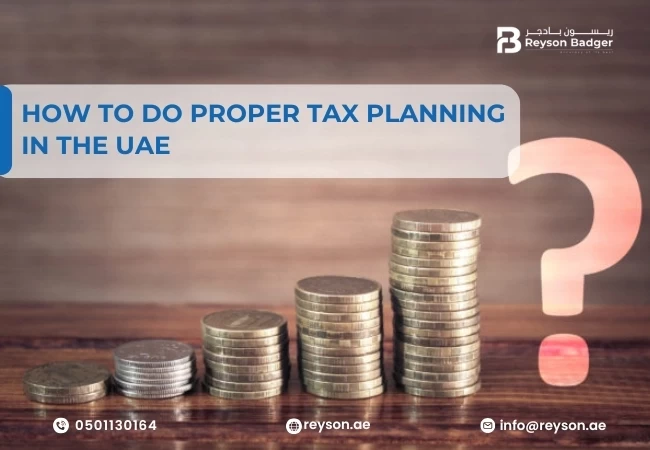How to do proper Tax Planning in the UAE
Written By Akshaya Ashok, Reviewed By Retheesh R S
Published on 13/11/2024

In the UAE, a tax is a cost imposed by the government on individuals and businesses. This includes business tax, VAT, and excise duty.
Tax planning in the UAE is the strategic management of finances to lower tax liabilities while conforming to all applicable tax laws and regulations. This includes identifying tax-saving opportunities like deductions, credits, and exemptions, as well as structuring financial transactions to maximise tax efficiency.
With the recent advent of corporation tax in the UAE, proper tax planning has become more essential. Companies can significantly reduce their tax liabilities and enhance their overall financial performance by navigating the tax system with skill.
What are the Benefits of Tax Planning?
Legal Protections: Effective tax planning ensures compliance with the tax laws, reducing the risk of fines and legal issues.
- Maximising Deductions: By identifying and claiming eligible deductions, businesses can significantly reduce their taxable revenue, resulting in lower tax liabilities.
- Improving Cash Flow: Strategic tax planning can increase cash flow by simply timing income recognition and expense deductions.
- Minimising Tax Liability: Companies can lower their total tax liability with strategic planning, allowing them to keep cash for future development and expansion.
- Investment Incentive: Strategic tax planning enables firms to take advantage of various tax breaks and incentives offered by the UAE government, such as free zone benefits and R&D tax credits.
- Compliance and Risk management: An organized tax plan allows businesses to comply with complex tax regulations, lowering the probability of audits and penalties.
- Strategic Business Decision-making: Tax considerations can have a significant effect on strategic corporate decisions including mergers, acquisitions, and global expansion.
- Optimising Employee Benefits: Implementing tax-efficient benefit packages can attract and retain the finest workers while lowering the tax burden for both businesses and employees.
- Avoiding Penalties: Meeting tax deadlines and submitting correct tax returns can help businesses avoid penalties and interest fees.
- Business Continuity: Strategic tax planning improves a company's long-term viability by increasing cash flow, lowering tax liabilities, and guaranteeing compliance with tax rules.
Basic rules for Tax planning in UAE
Corporate Tax:
- Companies that generate a taxable income over AED 375,000 are liable to a corporate tax rate of 9%.
- Companies that have a taxable income under AED 375,000 are not required to pay corporate tax.
Value-Added Tax (VAT):
- Most goods and services are subject to a standard VAT rate of 5%.
- Some products and services are zero-rated or excluded from VAT.
Excise Duty:
- A particular tax is imposed on specific products such as tobacco, alcohol, and soft drinks.
Transfer Pricing:
- Transactions involving related parties should follow the Arm's length principle.
- Comprehensive documentation is necessary to support transfer pricing agreements.
Agreements to Prevent Double Taxation:
- The UAE has established multiple Double Taxation Agreements to prevent double taxation on earnings generated in foreign nations.
Incentives for Taxes in Free Zones:
- Eligible free zone companies might benefit from tax exemptions
Documentation Management:
- Companies need to keep precise and comprehensive financial records.
- Compliance with VAT and corporate tax documentation requirements is essential.
Tax Filings:
- It is crucial to file corporate tax returns and VAT returns on time.
Expert Guidance:
- It is advisable to seek advice from a tax consultant to enhance tax planning methods and maintain compliance.
How to get the best Accounting services for tax planning in UAE
- Tax Proficiency: Seek a company with an established history in tax strategy and adherence.
- Industry Focus: A company that focuses on your sector can offer customised guidance.
- Keeping Informed: Make certain the company complies with the newest tax laws and regulations.
- Client Feedback: Favourable reviews and endorsements signify the firm's level of service.
- Years of Experience: A company with extensive experience typically possesses a more profound knowledge of tax regulations and tactics.
- Transparent Interaction: Clear interaction is vital to guarantee comprehension and prevent misinterpretations.
- Availability: A responsive company is always on hand to address your inquiries and offer prompt guidance.
- Apart from Tax Planning: Imagine a company that provides a variety of services, such as accounting, bookkeeping, and financial consulting.
- Forward-thinking Strategy: A forward-thinking company will recognize possible tax savings options and offer prompt guidance.
- Clear Fees: Knowing the firm's fee structure allows you to plan your budget efficiently.
- Worth for Investment: Evaluate the benefits the company offers regarding tax reductions and strategic guidance.
By thoughtfully evaluating these elements, you can choose an accounting firm that will assist you through accounting services such as enhancing your tax strategy and reducing your tax burden.
Successful Tax Planning in UAE involves comprehending the different taxes and wisely organizing your finances. This reduces tax obligations and enhances cash flow. Seeking the expertise of a reputable accounting firm like our company Reyson Badger is essential. We assist you in navigating the intricacies of the UAE tax framework, discovering tax-saving possibilities, and other accounting services. Through effective planning and professional advice from Reyson Badger, you can confidently manage the UAE tax environment and concentrate on expanding your business.
FAQs for Tax Planning in UAE
1.When should I start Tax planning?
Ideally, tax planning should start at the beginning of the financial year, though it is still possible to do so at any time of the year. You can also organise your investment, expenses, and income in a certain way so that you can fully utilize strategies for tax optimization. For best accounting services seek help from a tax consultant or a local accounting firm.
2. How can I reduce my Tax Liability?
Here are a few tips for Tax Liability:
- Invest in Tax-Advantage Tools: Take advantage of choices such as retirement funds, health coverage, and education savings accounts.
- Deductions and Credits to Claim: Recognize qualifying deductions for costs such as home loan interest, medical bills, and charitable contributions.
- Schedule Your Revenue and Costs: Intentionally plan when to recognize income and deduct expenses.
- Consult a Tax Expert: Obtain professional guidance to optimize your tax savings.
3. What are the risks of Poor Tax planning?
Ineffective tax planning can result in various adverse outcomes:
- Increased Tax Obligation: Poor planning may lead to a larger tax payment.
- Increased Tax Obligation: Poor planning may lead to a larger tax payment.
- Fines and Charges: Delayed submission or insufficient tax payment may result in fines and interest fees.
- Legal Concerns: Failing to adhere to tax regulations may result in legal problems.
4. Can a Tax Advisor help me with Tax Planning in UAE?
Yes, They can offer specialised guidance customised to your requirements. By working with a tax advisor or using accounting services, you can enhance your tax strategy, discover tax-saving possibilities, and ensure compliance with tax regulations.

Written By
Akshaya Ashok
Akshaya Ashok is a content writer specializing in creating content focused on accounting and auditing. With over two years of experience, she has developed expertise in crafting professional content for the financial sector.

